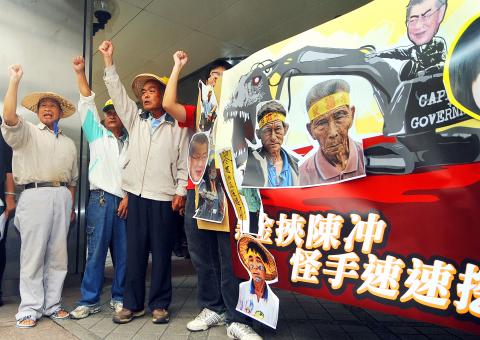Representatives of farmers from Changhua County’s Sijhou Township (溪州) and farming activists protested outside the National Science Council (NSC) building in Taipei yesterday after the council neglected to invite them to take part in a meeting about a project to divert water from their local irrigation system to the Central Taiwan Science Park.
“The Cabinet promised to call a meeting on the controversial project within a week after hundreds of farmers staged a five-hour sit-in outside the Executive Yuan under a baking sun last week,” said Lin Le-xin (林樂昕), a member of the Taiwan Rural Front. “Instead of calling the meeting itself, the Executive Yuan asked the NSC to do so and most of the participants are those who support the project, while the farmers — who are the most affected — are excluded.”
Attendees at the meeting included Changhua County Commissioner Cho Po-yuan (卓伯源), Chinese Nationalist Party (KMT) legislators Lin Chang-min (林滄敏) and Cheng Ju-fen (鄭汝芬), and Changhua Irrigation Association chairman Lu Lu-shan (呂爐山).

Photo: Liao Chen-Huei, Taipei Times
Democratic Progressive Party legislators Tien Chiu-chin (田秋堇) and Lin Shu-fen (林淑芬), and Sijhou Township Mayor Huang Sheng-lu (黃盛祿) — who are all opposed to the aqueduct project — decided not to attend the meeting in protest.
The disputed project is a plan, started in February, to build an aqueduct to divert water from Cizaipijun (莿仔埤圳), the main irrigation system in southern Changhua County, to the science park’s fourth-phase campus in Erlin Township (二林).
While local farmers have long opposed what they consider “water-jacking,” the NSC announced that, since the Erlin campus project was not going as smoothly as planned, it would readjust the project and halt construction of the aqueduct.
That announcement was welcomed by the farmers, but their joy did not last long because construction continued. The NSC later said that, despite the decision by National Science Council Minister Cyrus Chu (朱敬一) to stop the construction, it had to be continued because the council had to honor a contract.
“On one hand, the NSC says it is readjusting the plan for the Erlin campus, yet on the other hand, it is continuing with the construction of an aqueduct which is very likely to become useless,” Taiwan Rural Front spokeswoman Frida Tsai (蔡培慧) said. “When the NSC calls a meeting to talk about the controversial aqueduct, it mostly invites those who support it.”
“The government is insincere and the meeting is useless,” Tsai said.
Tsai, along with the farmers, tore up copies of a notice about the meeting.
Farmer Pao Wan-tien (包萬添) said that each extra day of construction was one more day of taxpayers’ money wasted.
The meeting ended at about 6:30pm and National Science Council Vice Minister Hocheng Hong (賀陳弘) told a press conference that the council would continue construction of the aqueduct to honor its contract until a major decision is made to readjust the plan for the Erlin Campus.
“We’ll speak with other ministries and government agencies to see how the plan for Erlin Campus can be changed,” Hocheng said. “We will do it as soon as possible, but it will take at least two months.”

Chinese Nationalist Party (KMT) Chairman Eric Chu (朱立倫), spokeswoman Yang Chih-yu (楊智伃) and Legislator Hsieh Lung-chieh (謝龍介) would be summoned by police for questioning for leading an illegal assembly on Thursday evening last week, Minister of the Interior Liu Shyh-fang (劉世芳) said today. The three KMT officials led an assembly outside the Taipei City Prosecutors’ Office, a restricted area where public assembly is not allowed, protesting the questioning of several KMT staff and searches of KMT headquarters and offices in a recall petition forgery case. Chu, Yang and Hsieh are all suspected of contravening the Assembly and Parade Act (集會遊行法) by holding

PRAISE: Japanese visitor Takashi Kubota said the Taiwanese temple architecture images showcased in the AI Art Gallery were the most impressive displays he saw Taiwan does not have an official pavilion at the World Expo in Osaka, Japan, because of its diplomatic predicament, but the government-backed Tech World pavilion is drawing interest with its unique recreations of works by Taiwanese artists. The pavilion features an artificial intelligence (AI)-based art gallery showcasing works of famous Taiwanese artists from the Japanese colonial period using innovative technologies. Among its main simulated displays are Eastern gouache paintings by Chen Chin (陳進), Lin Yu-shan (林玉山) and Kuo Hsueh-hu (郭雪湖), who were the three young Taiwanese painters selected for the East Asian Painting exhibition in 1927. Gouache is a water-based

Taiwan would welcome the return of Honduras as a diplomatic ally if its next president decides to make such a move, Minister of Foreign Affairs Lin Chia-lung (林佳龍) said yesterday. “Of course, we would welcome Honduras if they want to restore diplomatic ties with Taiwan after their elections,” Lin said at a meeting of the legislature’s Foreign Affairs and National Defense Committee, when asked to comment on statements made by two of the three Honduran presidential candidates during the presidential campaign in the Central American country. Taiwan is paying close attention to the region as a whole in the wake of a

OFF-TARGET: More than 30,000 participants were expected to take part in the Games next month, but only 6,550 foreign and 19,400 Taiwanese athletes have registered Taipei city councilors yesterday blasted the organizers of next month’s World Masters Games over sudden timetable and venue changes, which they said have caused thousands of participants to back out of the international sporting event, among other organizational issues. They also cited visa delays and political interference by China as reasons many foreign athletes are requesting refunds for the event, to be held from May 17 to 30. Jointly organized by the Taipei and New Taipei City governments, the games have been rocked by numerous controversies since preparations began in 2020. Taipei City Councilor Lin Yen-feng (林延鳳) said yesterday that new measures by